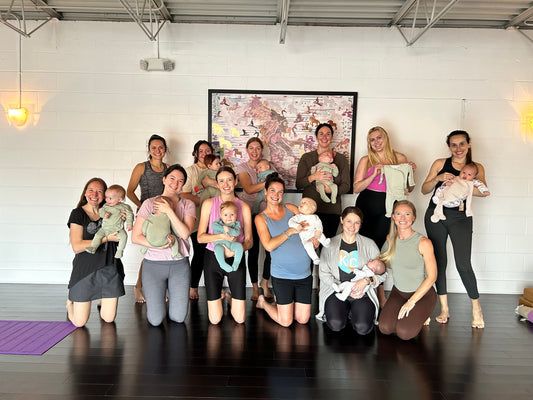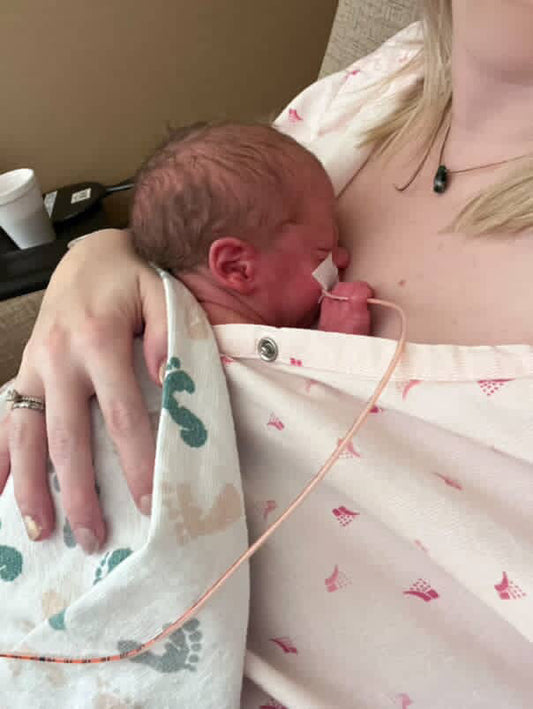Share
A Fully Supported Postpartum Recovery with Dr. Morgan MacDermott, ND
Navdeep Singh
Guest post by Dr. Morgan MacDermott, ND
Preparing for postpartum is one of the most underrated yet impactful things you can do to influence your experience of new motherhood in a positive way. That's a big claim, and I stand behind it through and through. Perhaps you're already well-versed in postpartum healing and have a good sense of what's to come, but maybe you're not. Maybe you hadn't thought about anything past giving birth yet, since that's a very exciting and potentially nerve wracking event coming up on your calendar. How women prepare (or don't) for the postpartum time period differs throughout the world.
Let's dive into where we stand as a culture currently, then hit where we came from historically - and how the nature of the care has shifted. It's an important, and sadly stark difference that we need to honor in order to move forward with healthier goals. Then, let's go over the principles of postpartum preparation and healing so that you can begin to build your resources and support systems now - and then when your baby comes, you're able to soak up the bonding and skin-to-skin snuggles as much as possible. Ok, here we go!
Understandably, there is a lot of societal buzz and attention around pregnant women - shopping for the baby, preparing a nursery, baby showers, and getting ready for the big day of birth. Pregnancy is a sacred time for any family, especially first time parents who are learning as they go along. Birth preparation has finally entered the conversation on a cultural level, and for that we are very excited, as it used to be that many families "went in blind" hoping for the best. But now the options for birth education via classes, affirmations, audio tracks, podcasts, and books are seemingly endless. This is a very positive change because the more educated we are about the huge event of birth, the better outcomes families experience. Ok, pregnancy - check. Birth - check. That leaves us at the next step in the process of growing a family: postpartum.
The cold, hard reality is that our culture does not prepare women for this phase - almost at all. In fact, many people automatically think only of “postpartum depression” when the word "postpartum" is said.
What the word really refers to is the phase of life a new mother experiences after birthing her baby - all the hormonal and physiological changes that shift in her body yet again, and this time - in the direction of being able to mother. This includes birth recovery, the ability to make milk and to handle sleep disturbances, and certain changes to brain anatomy that allow her to attune better to her children.
There's hardly any talk or effort put into discussing postpartum healing and the amount of rest and support new families need when a new baby arrives. It's assumed that having a newborn is tough work, and it is, but again - these assumptions are baby-centric. The mother gets left in the dust. And while that's commonplace here in the US, the vast majority of ancient cultures around the world placed very high value on a mother's postpartum healing and resting period - so much so that it was (and still is in many areas) typical for a new mother to not even leave her bed for the first 40 days after birth. Forty days! We can barely get American women to stay home for 5 or 6 days before hitting the gym or taking a Target run.
Extended resting periods are seen independently of each other all around the globe - and for good reason. Growing and birthing a baby is a really, really big deal for our bodies. But breastfeeding and caring for a newborn around the clock, with a body that went through 9 months of growing this child and then however many hours of birth - is the bigger deal. Breastfeeding is incredibly energetically taxing, and requires nearly double the extra calories per day as pregnancy - and not to mention it takes as many hours in the day as a full time job!
Before the days of formula, a baby's ability to get milk from its mother meant life or death - and the community knew this. They did everything in their power to support the mother so that she was rested, fed, and allowed to bond with her new baby creating strong oxytocin loops between her brain and breasts that would then continue to keep the milk flowing. It's a beautiful system. A woman who is allowed to focus solely on her newborn and her own newborn-motherness, who can eat nourishing food and pass off other daily tasks to friends and family, can enter motherhood feeling resilient and replenished, and is much less likely to experience maternal mental health disorders or burn out.
Oftentimes, women ride an oxytocin high for several days or weeks postpartum and feel really good and energetic - in love with their new family. They may not focus on their healing, their food, rest, and other important aspects of postpartum care. Only to then come crashing down after the rush wears off and the realities of disrupted sleep and newborn growth spurts hit.
It doesn't have to be this way. We don't have to cycle through complete burnout or postpartum depression (which affects 1 in 5 mothers) in order to value certain principles of how we should be taking care of our bodies. Ancient mothers weren't given the choice because they felt good - it was standard practice to care for them in a standard way because they had learned through hundreds and thousands of years what was needed to support a healthy mother and healthy baby.
A woman's fully supported recovery means she can optimally care for her children - the next generation - which will then grow up to care for her and other family members, the community, and the planet.
This is the continuation of life as we know it, and if we want to make solid changes in the way humans are caring for each other and the planet, we must raise well-loved children from healthy parents. It's all very Lion King, in a way.
More about our guest writer:
Dr. Morgan is a rising leader in women’s reproductive health committed to helping modern mothers transform their daily struggles into stepping stones toward a more supported, balanced, and confident state of being. In a broad sense, she believes that the health of the mother is the health of the community, and it is imperative we treat her as such.
As a licensed Naturopathic Doctor and mother of three young children, she blends functional medical expertise, clinical skill, and first-hand experience to help women navigate wellness for themselves and their families.
She is the founder of Milk Medicine™, a comprehensive online community of educational resources guiding women through the many transitions of motherhood - from pregnancy, through birth, and throughout postpartum.
Her passions sparked out of her own motherhood journey struggling greatly with recurrent breastfeeding issues, postpartum anxiety, and burnout with her first child. She knows the importance of postpartum planning, education, and support and is determined to change the societal narrative around supporting mothers. She sees pregnancy, postpartum, and pediatrics in a private practice in Eagle, Idaho.
Stay tuned for next week's article to read about the four essential principles of postpartum healing with Dr. Morgan.
Share
-
Category:
- All posts



